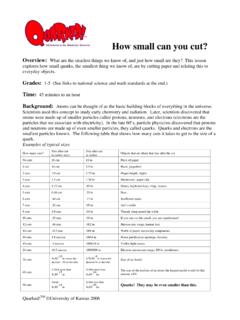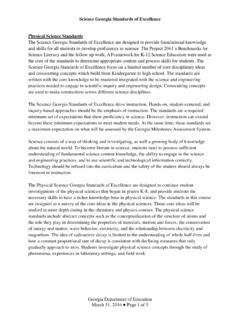Transcription of chapter 2
1 24 INTRODUCING SOCIOLOGY. chapter 2. TERMS, CONCEPTS AND THEIR USE IN SOCIOLOGY. terms and concepts to understand this. I. Why does sociology need to have a special set of terms when we use terms INTRODUCTION like status and roles or social control The previous chapter introduced us to anyway in our everyday life? an idea both about society as well as For a discipline such as, say, sociology. We saw that a central task of nuclear physics that deals with matters sociology is to explore the interplay of unknown to most people and for which society and the individual. We also saw no word exists in common speech, it that individuals do not float freely in seems obvious that a discipline must society but are part of collective bodies develop a terminology.
2 However, like the family, tribe, caste, class, clan, terminology is possibly even more nation. In this chapter , we move further important for sociology, just because its subject matter is familiar and just to understand the kinds of groups because words do exist to denote it. We individuals form, the kinds of unequal are so well acquainted with the social orders, stratification systems within institutions that surround us that we which, individuals and groups are cannot see them clearly and precisely placed, the way social control operates, (Berger 1976:25). the roles that individuals have and play, For example we may feel that since and the status they occupy.
3 We live in families we know all about In other words we start exploring families. This would be conflating or how society itself functions. Is it equating sociological knowledge harmonious or conflict ridden? Are with common sense knowledge or status and roles fixed? How is social naturalistic explanation, which we have control exercised? What kinds of discussed in chapter 1. inequalities exist? The question however We also found in the previous remains as to why do we need specific chapter how sociology as a discipline TERMS, CONCEPTS AND THEIR USE IN SOCIOLOGY 25. has a biography or history. We saw how essentially harmonious. They found it certain material and intellectual useful to compare society to an developments shaped the sociological organism where different parts have a perspective as well as its concerns.
4 Function to play for the maintenance of Likewise sociological concepts too have the whole. Others, in particular the a story to tell. Many of the concepts conflict theorists influenced by Marxism reflect the concern of social thinkers to saw society as essentially conflict understand and map the social ridden. changes that the shift from pre-modern Within sociology some tried to to modern entailed. For instance understand human behaviour by sociologists observed that simple, small starting with the individual, micro scale and traditional societies were interaction. Others began with macro more marked by close, often face-to- structures such as class, caste, market, face interaction.
5 And modern, large state or even community. Concepts scale societies by formal interaction. such as status and role begin with the They therefore distinguished primary individual. Concepts such as social from secondary groups, community control or stratification begin from a from society or association. Other larger context within which individuals concepts like stratification reflect the are already placed. concern that sociologists had in The important point is that these understanding the structured classifications and types that we inequalities between groups in society. discuss in sociology help us and are the Concepts arise in society.
6 However tools through which we can just as there are different kinds of understand reality. They are keys to individuals and groups in society so open locks to understand society. They there are different kinds of concepts and are entry points in our understanding, ideas. And sociology itself is marked by not the final answer. But what if the key different ways of understanding society becomes rusted or bent or does not fit and looking at dramatic social changes the lock, or fits in with effort? In such that the modern period brought about. situations we need to change or modify We have seen how even in the early the key. In sociology we both use and stage of sociology's emergence there also constantly interrogate or question were contrary and contesting the concepts and categories.
7 Understandings of society. If for Karl Very often there is considerable Marx class and conflict were key unease about the coexistence of concepts to understand society, social different kinds of definitions or concepts solidarity and collective conscience or even just different views about the were key terms for Emile Durkheim. In same social entity. For example conflict the Post-World War II period sociology theory versus the functionalist theory. was greatly influenced by the structural This multiplicity of approaches is functionalists who found society particularly acute in sociology. And it 26 INTRODUCING SOCIOLOGY. cannot but be otherwise.
8 For society II. itself is diverse. SOCIAL GROUPS AND SOCIETY. Activity 1 Sociology is the study of human social Choose any one of the following life. A defining feature of human life is topics for class discussion : that humans interact, communicate democracy is a help or hind- and construct social collectivities. The rance to development comparative and historical perspective of sociology brings home two appa- gender equality makes for a rently innocuous facts. The first that in more harmonious or more divisive society every society whether ancient or feudal or modern, Asian or European or punishments or greater dis- African human groups and collectivities cussion are the best way to exist.
9 The second that the types of resolve conflicts. groups and collectivities are different in Think of other topics. different societies. What kind of differences emerged? Any gathering of people does not Do they reflect different visions of necessarily constitute a social group. what a good society ought to be like? Aggregates are simply collections of Do they reflect different notions of people who are in the same place at the the human being? same time, but share no definite connection with one another. In our discussion on the various Passengers waiting at a railway station terms you will notice how there is or airport or bus stop or a cinema divergence of views.
10 And how this very audience are examples of aggregates. debate and discussion of differences Such aggregates are often termed as helps us understand society. quasi groups. What kind of groups are these? TERMS, CONCEPTS AND THEIR USE IN SOCIOLOGY 27. A quasi group is an aggregate or attention to how social groups emerge, combination, which lacks structure or change and get modified. organisation, and whose members A social group can be said to have may be unaware, or less aware, of the at least the following characteristics : existence of groupings. Social classes, (i) persistent interaction to provide status groups, age and gender groups, continuity.

















